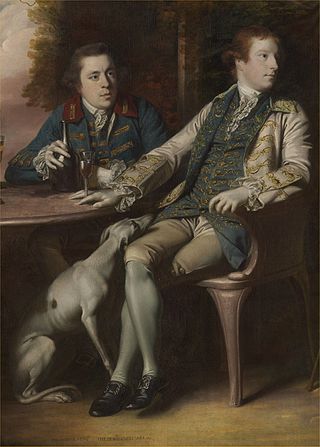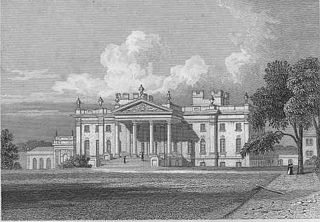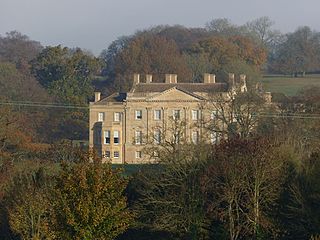Related Research Articles

General John Campbell, 4th Duke of Argyll, KT, PC was a Scottish military officer, Whig politician and peer who sat in the British House of Commons from 1713 to 1761.

Sir Horatio (Horace) Mann, 2nd Baronet was a British politician who sat in the House of Commons between 1774 and 1807. He is remembered as a member of the Hambledon Club in Hampshire and a patron of Kent cricket. He was an occasional player but rarely in first-class matches.
Lord William Manners, of Croxton Park, Leicestershire was an English nobleman and Whig politician who sat in the House of Commons between 1719 and 1754. He was the second son of John Manners, 2nd Duke of Rutland and his first wife, Catherine Russell. His brothers John, Robert and Sherard were also Members of Parliament.

Thomas Grey Egerton, 1st Earl of Wilton, known as Sir Thomas Grey Egerton, Bt from 1766 to 1784, was a British politician who sat in the House of Commons from 1772 to 1784 when he was raised to the peerage as Baron Grey de Wilton.

Henry Fane was a British politician who sat in the House of Commons for 30 years between 1772 and 1802.

Sir Thomas Hales, 2nd Baronet was an English politician who sat in the English and British House of Commons between 1701 and 1747.
Sir Charles William Rouse Boughton was an administrator in India with the East India Company and subsequently a member of the British House of Commons representing first Evesham and then Bramber.

Charles Bertie of Uffington, near Stamford, Lincolnshire was a British politician who sat in the House of Commons from 1711 to 1727.

Thomas Morgan was a Welsh lawyer and politician who sat in the House of Commons from 1723 to 1769.
William Forester, of Dothill in Wellington, Shropshire was an English landowner and Whig politician who sat in the House of Commons in three Parliaments between 1715 and 1758.
Hon. Charles Finch was an English politician who sat in the House of Commons from 1775 to 1780.

Robert Knight, 1st Earl of Catherlough, KB, (1702–1772), was a British Member of Parliament for Great Grimsby, Castle Rising, Norfolk (1747–54) and Milborne Port, Somerset (1770–72). He became successively Baron Luxborough (1745), Viscount Barrells and Earl of Catherlough, all titles within the peerage of Ireland. His wife, Henrietta Lady Luxborough, later became well known as a lady of letters, poet and pioneering landscape gardener.
Richard Neville of Billingbear, Berkshire, was an English Whig politician, who sat in the English and British House of Commons from 1695 to 1710.
Hon. Sir William Stanhope (1702–72), of Eythrope, Buckinghamshire, was an English landowner and opposition Whig politician, who sat in the House of Commons for 35 years between 1727 and 1768. Afflicted with deafness and ill-health, he travelled frequently and was often absent from Parliament.
Major Anthony Morgan of Freshwater, Isle of Wight was a British Army officer, and Whig politician who sat in the House of Commons between 1695 and 1729. He was a Lieutenant-Governor of the Isle of Wight.

Thomas Duncombe was a British politician who sat in the House of Commons between 1751 and 1779.

Isaac Martin Rebow was a British landowner and politician who sat in the House of Commons between 1755 and 1781.

James Martin (1738–1810) was a British banker and politician who sat in the House of Commons for 31 years from 1776 to 1807.

Edmund Bray (1686–1725) of Barrington Park, Gloucestershire was a British politician who sat in the English House of Commons from 1701 to 1708 and in the British House of Commons from 1720 to 1722.
William Rawlinson Earle, of Eastcourt House, Crudwell, near Malmesbury, Wiltshire, was a British politician who sat in the House of Commons for 40 years between 1727 and 1768.
References
- 1 2 3 "VAN, Charles (d.1778), of Llanwern, Mon". History of Parliament Online. Retrieved 9 October 2017.
- 1 2 "Llanwern Park, Garden, Llanwern (266046)". Coflein. RCAHMW.